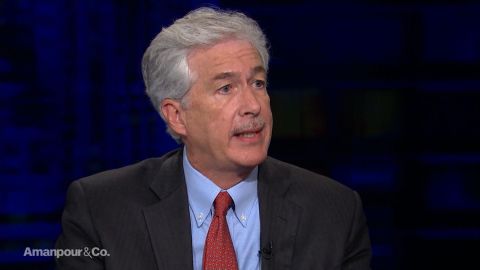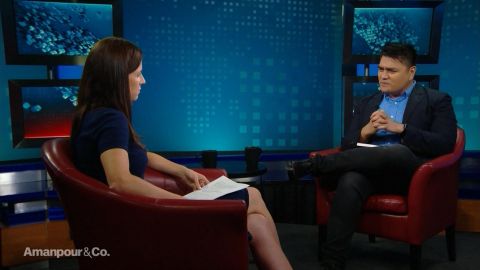Read Transcript EXPAND
ALICIA MENENDEZ: What I remember most about your coming out was that you were very prepared for what those who are anti-immigrant would say.
JOSE ANTONIO VARGAS, JOURNALIST: Oh, very prepared.
MENENDEZ: Less so prepared for what members of the Immigrant Rights community would think about you.
VARGAS: And progressives in general. Because you know, as a journalist I never identified as either. You know, I’m gay, I’m undocumented; I’m Filipino. I mean, for some people that would just automatically mean I’m a Progressive. But since I never have voted. I just — I never really claimed a party in that way. So being thrust into this immigrant rights, racial justice progressive movement was really new to me. Especially on the other side. Right?
MENENDEZ: What was new to you and there were people who were very resentful — about the fact that you had not shown up sooner.
VARGAS: Yeah, no, they’re like, we’ve been protesting since we were in high school.
(LAUGHTER)
You know, while you were lying and making money, you know, at the Washington Post and the Chronicle and all those sort of places that you were working at. Right. And so there was a lot of. not only resentment, but I think just uncertainty about what is he going to do?
MENENDEZ: Was that fair?
VARGAS: You know, look, like was it fair? I don’t — no, personally for me it wasn’t. People cling onto what they fear because it’s a lot easier. And in college I majored in African American Studies and Political Science and so like — so much of what I learned about America was from kind of the perspective of people who had always, were challenging America. So I was coming from this place of, no, we’re actually challenging the definition of it. This is not some blind patriotism. Right? And patriotism — what is wrong with patriotism? You know, there’s nothing wrong with saying, I think, right, that I am proud to be an American. I am proud of it. But I think with that pride comes the criticisms and the fact that this country is not only imperfect, right, but we’re living in a crisis. Our democracy is in crisis. Right? I think those two things can coexist.
MENENDEZ: Bill O’Reilly called you “the most famous illegal in America”.
(LAUGHTER)
Despite the juxtaposition of words, how has your notoriety, though, protected you?
VARGAS: Oh, I’m sure it’s protected me. Oh, I’m definitely sure of that. And I think the guilt that I carry because of that, right, you know, in the book I write for the first time about what happened when I was arrested in Texas, summer of 2014. And how I got out. Right? I was detained for eight hours in McAllen; the same place where the kids are being caged and locked up with families, well, separated from families. And I got out after eight hours. And I didn’t really want to know how I got out. But in writing the book I had to figure out who we called — and why and all of that.
MENENDEZ: Because of the guilt.
VARGAS: The guilt about — I get arrested; it’s breaking news on CNN, right, and people care. You know, people are getting arrested and detained every day (INAUDIBLE) —
(CROSSTALK)
MENENDEZ: Where a mom gets her kid ripped from her at the border and she’s anonymous.
VARGAS: Right. She’s anonymous. And I think we’re getting at a point now in this country where I don’t know about you, but it’s just so much that I can’t process everything, and yet I have to keep looking at it; I have to keep reading it, I have to keep watching. We should not be desensitized from it. Right. So that has been hard. And you know, when Bill O’Reilly said that, I think in the same interview he said to me that I don’t deserve to be in America. Right. Which again, gets us to this question of wait a second, like you know, what does Bill O’Reilly, what has he done to deserve to be in America? Too? I think that’s, you know, just kind of flipping the question around. So when I wrote that, I really wanted to pose the question really to readers and the audience about this process of earning and what that’s about. Like you’re a U.S. citizen because you were born here. Right? So is that it? Congratulations. (LAUGHS) The accident of birth. And then we’re telling people all across this country that, you know, they have to earn their citizenship while we talk about them like they’re insects off our backs and we treat them like criminals — what are we doing? I have three questions. Where did you come from? How did you get here? Who paid? If you can’t answer those three questions, you have no right to talk to anyone about what borders they cross, right, or what laws they’re breaking.
MENENDEZ: So really break it down for people. You’re 12 years old. Your mom takes you to the airport in the Philippines and she puts you on a plane. Why were you not able to come to the United States legally?
VARGAS: Ah, because my grandparents could not petition me, so it’s not considered a close enough of a relationship for my grandma or my grandpa, even though they were U.S. citizens, to petition a grandson. Right?
MENENDEZ: Do we know how much your mother paid that smuggler to take you on that plane?
VARGAS: My mother couldn’t pay; it was my grandfather. Right. It was $4,500.
MENENDEZ: How did you get that money?
VARGAS: Saved. Can you imagine? Can you imagine how much time was spent trying to save that money? When I think back on it now, I’m trying to understand like how long they had planned it. And how much my mother, who didn’t have the money, really understood what she was doing. Like when she said, “Yeah, he can come,” did she really know what that meant? I don’t know. Like you know, my grandmother was the food server; she made maybe $4.50 an hour when I first got here, or five dollars maybe. My grandfather was a security guard; he made a little more, like six or seven dollars an hour. And so you know, it was really interesting when you add it up, the fact that he had to take care of a family here, including me and then at the same time provide for a family back in the Philippines, which again, is the reality for so many immigrants in this country, right. And then the kind of cycle of dependency that it’s created, right, that they take care of my mom, so now I take care of my mom and then the cycle goes on and on and on.
MENENDEZ: How long did it take before you realized she was never coming?
VARGAS: Oh, I didn’t realize that until I found out I was here illegally, which was four years later, when I tried to apply for a driver’s license, right, which is like, is there anything more American than driving? So I was 16. My friend Arvin Murphy was like, I’m getting tired of (LAUGHS) driving you around; in the nicest possible way he said that and that’s when all the lies that I had been told started kind of unraveling. And that’s why, for me — you know, in writing the book, look, there are 11 million undocumented people in this country, although I would argue that there’s far more than 11 million people — I mean, if we counted all the undocumented white people, the undocumented black people or undocumented Asian people that we rarely talk about, I think it’s more than 11 million people. But in writing the book, I really struggled trying to figure out, how do I write this in such a way that other people who may not share my specific circumstances, right, could relate to it and so coming up with this idea with my editor, actually, that you know, these phases that we live through, which is we lie, we pass, we try to pass and we hid. So —
MENENDEZ: But up until 16 you’re not lying. You’re in the dark and I think that there are people who will watch and say, but Jose, you’re very smart. How did you make it to 16 and not put all the pieces together?
VARGAS: How could I — at that point, that was four years of probably the most innocent time (LAUGHS) I had for myself. Like when I look back at that time, you know I mean, I was a sponge. I used to like just absorbed everything and I — no one around me was undocumented. In my view, at that time there was no social media, there was no Internet — whenever anybody said anybody was “illegal” or whenever anybody talked about the wall or the border or immigration, it was always about Mexican people. And so this was never — I just never thought of it as “my problem”.
MENENDEZ: You came out. There was response from those who are anti- immigrant, the response from the Progressive Movement and there was a response from your peers, your journalist peers.
VARGAS: Oh, yes.
MENENDEZ: And the fundamental question was, can you write about politics? Can you write about immigration? When you have such a personal story
(INAUDIBLE) at the heart of the issue.
VARGAS: That was certainly the question back in 2011. Originally my coming out, essay was supposed to come out in the Washington Post, not the New York Times and the Washington Post ended up killing the story and I had to like, you know, rally and get it to the New York Times and — and the Washington Post, of course, had to write a story about why they killed my story and (LAUGHS) the headline was “Why Did the Washington Post Deport Jose Antonio Vargas’s Story?” I had to read it. I hadn’t read it since — till I was writing the book. Because — I read it when it first came out seven years ago, but I didn’t want to read it because it was so painful. (LAUGHS) Journalism is sacred to me. Journalism is why I exist. Right? Like it’s the way I’ve been able to write myself into America. And I felt at that time that I was deported from my own industry. Right? It was so painful. And then to have all these people that I respected say that, you know, how do you trust a liar? Back then people were saying that this was a conflict of interest. It’s so interesting. After Trump’s election, those same people now I think are finally understood that we’re actually talking about a human rights issue. Right? Like you’re actually —
MENENDEZ: Do you really believe, though, that journalists have changed their stance? That now having a personal experience in something does not prohibit you from writing about it?
VARGAS: I think that process has started. I think that process, which is the same process, if you think about, that we went through during the Civil Rights Movement, you know, in the ’50s and ’60s. And during the Gay Rights Movement, right, that just happened and is still happening. Right? Journalists have to figure out, what are we really talking about here? Why are people’s existence being politicized? I think you’re seeing now more journalists and more institutions like the New York Times, NPR and Washington Post question their own newsrooms and still at this time, the New York Times and Washington Post, which helps set the agenda for many news organizations, still refer to people as “illegal” — they still used “illegal immigrant” and so that hasn’t stopped yet and absolutely we will keep pressuring them to do that.
MENENDEZ: For much of your life you defined yourself by your writing, defined yourself by journalism.
VARGAS: Yeah. In a way it became kind of my own wall. It was easier to write about other people than have to deal with myself. Right? So when I was “I wasn’t that anymore to people” — all of the sudden I’m like, well, who am I? (LAUGHS) So that I have to deal with that and I would arge —
MENENDEZ: And after you lie and pass and hide for so long, how do you answer that question?
VARGAS: I think you answer it by being as uncompromising — being as uncompromising as possible in trying to understand what motivates your actions and why you do what you do. But why do I do what I do? Why haven’t I just left? You know, sometimes people on Twitter, God, I love people who take time to like write you emails, you know. Right? You know, they see something on Twitter and they hate me or whatever and they write me an email and one time someone actually said, “You know, you’re being really selfish. Your mom may die sometime soon and if she dies you’re not there,” right? Or when somebody says, why don’t you just leave? And then I actually ask myself, yeah, why don’t I just leave? Well, because — this where I’m — America is where I became who I am. Migrating to this country is not only as simple as looking at that Statue of Liberty and you know, wanting the American dream. Many of us come here because you’re in our countries. Right? Like what has the United States done to El Salvador, Honduras and Guatemala? Like what does U.S. foreign policy and U.S. trade agreements have to do with migration patterns? Some people in the news media would call it a global migration crisis. I actually consider it a natural progression of history. Right. If the western world can come to our country, so those countries, right, and move to those countries, forcibly move to those countries, to build their economies — so why can’t people move now?
MENENDEZ: I want to read from the book. You write, “The truth is if Mama had known then what she knows now, that calling her on the phone is difficult because I can’t really pretend that I know the voice on the other end of the line. On one of our rare phone calls she said, and look at you now, the person you’ve become and how can I have any regrets? I’m sure she meant it as a statement, but it sounded like a question. The truth is, there’s a part of me, I’m not certain how much, who is still on that airplane wondering why Mama put me there,” have you forgiven your mom?
VARGAS: Oh my God, yes. (LAUGHS) I actually think the question now is — I wonder if she’s forgiven me. Like I wonder if — I wonder if she understands that it’s more than the money the send or the clothes or the Lancome makeup things, (INAUDIBLE) that she likes from Macy’s, that — that I don’t make sense without her. Right? And that the sacrifices — and really for a mother, it was the ultimate sacrifice that she made, is something that I’m trying to honor by doing what I do. I have to tell you though, I can’t wait to like see her in person and say thank you in person, without any cameras or without anybody else seeing it.
MENENDEZ: I want to ask about that. Because at the end of the book you do give her the last word —
(LAUGHTER)
And she says, maybe it’s time to come home.
VARGAS: No.
MENENDEZ: And I wonder if you are a person for whom there is a home.
VARGAS: I think defining “home” is something that’s going to be the work of my life. I think defining “home” for people who feel like they’re not at home — you know, we live in a, we’re in New York — we live in a country where Puerto Ricans in this country, after that hurricane feel like even though they’re citizens and in the country legally, they don’t feel like they are. I would argue that the Black Lives Matter Movement is a question of citizenship. Right? Like Elisa Garza, one of the cofounders of the movement said that, that this is actually about citizenship and who gets to belong in this country and who gets to call it what it is. I think that question of home is something that all of us grapple with and I think that is going to be the work of my life, is figuring that out.
MENENDEZ: Jose, thank you so much.
VARGAS: Thank you for having me.
About This Episode EXPAND
Christiane Amanpour interviews William Burns, Former U.S. Deputy Secretary of State; and Sally Field, actress and author of”In Pieces.” Alicia Menendez interviews Jose Antonio Vargas, author of “Dear America” and founder, Define American.
LEARN MORE


